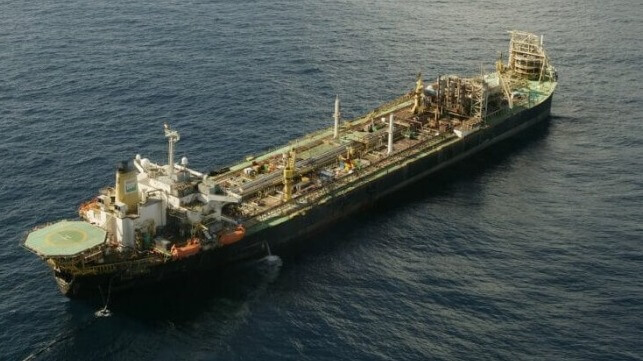For the First Time, Petrobras Picks a Domestic Yard to Scrap an FPSO

Following the controversy over the handling of the decommissioned aircraft carrier NAe São Paulo, Brazil has taken a rare move towards sustainable ship recycling: state owned offshore oil giant Petrobras has announced plans for in-country scrapping of the P-32, an aging FPSO due for demolition.
Last week, Petrobras concluded the auction sale of the P-32, an FPSO which had been operating in the Marlim field of the Campos Basin. The unit will be the first to follow the company’s new model of "sustainable destination" of vessels, and for the first time for an FPSO, Petrobras has selected a recycling yard in Brazil.
In February, Petrobras adopted a new policy on environmental and human rights in its supply chain. The policy includes selecting a final destination for decommissioned units to ensure that they are dismantled with a focus on sustainability. In particular, the policy mandates the recycling of vessels only in facilities equipped with dry-docks or impermeable surfaces with drainage systems, and this rules out old-fashioned beaching.
On July 7, Petrobras awarded the auction for P-32 to the steel company Gerdau S.A., in partnership with Ecovix shipyard. Petrobras' plan was to direct the sale to the domestic market and inaugurate a new stage of the decommissioning industry in Brazil. According to Petrobras, this could be an opportunity for Brazil to establish itself in the sustainable recycling of vessels, a niche market with limited competition outside of Europe.
Petrobras set tough technical criteria and requirements for bidders. As the winner, Gerdau S.A will have to present a recycling plan covering all stages from the receipt of the unit to the final disposal of the waste. Petrobras says that it will closely monitor the execution of the plan in order to ensure compliance.
Like many older FPSOs, the P-32 was created as a conversion of a single-hulled tanker, the 1974-built VLCC Cairu. She entered service with Petrobras in 1997, and she was one of the ten units producing in the Marlim and Voador fields in the Campos Basin. These aging floaters are being replaced by the new FPSOs Anna Nery and Anita Garibaldi as part of a revitalization project.
“We want everything to be done within strict criteria and we know that not all countries have the technical conditions to meet them, but Brazilian shipyards can adapt very easily to these requirements. This means an opportunity for the national industry,” said Carlos Travassos, Petrobras director of Engineering, Technology and Innovation.
Petrobras decision to dismantle the unit in Brazil has received praise from environmentalists, with the NGO Shipbreaking Platform describing it as an “important precedent." Petrobras is expected to retire more than two dozen older FPSOs before the end of the decade, and if it continues to use the same domestic-demolition policy, a substantial amount of tonnage will stay off the beaches of South Asia.
“After years of selling numerous old vessels for dirty and dangerous shipbreaking on the shores of South Asia, Petrobras has finally committed to environmental stewardship by unequivocally disavowing such practices. Moreover, their decision to opt for a domestic solution, leveraging the state-of-the-art infrastructure available in Brazil, showcases that it is possible to find alternative and better solutions to beaching,” said Nicola Mulinaris, NGO Shipbreaking Platform Senior Communication and Policy Advisor.
SBM Offshore and Shell are also choosing facilities with more environmentally-friendly practices to handle their end-of-life assets, according to NGO Shipbreaking Platform.

that matters most
Get the latest maritime news delivered to your inbox daily.
The praise marks something of a turnaround: NGO Shipbreaking Platform was among the environmental groups that condemned Brazil over the handling of the aircraft carrier NAe São Paulo, whose six months of dismantling drama ended when the aircraft carrier was sunk far off the northeast coast of the country.
The project also represents a new form of opportunity for the Brazilian shipyard sector. Ecovix, which owns the Rio Grande Shipyard in southern Brazil, struggled through years of judicial restructuring after Petrobras canceled contracts for platform construction in 2016. It just restarted shipyard operations in 2021 after a long hiaitus.
